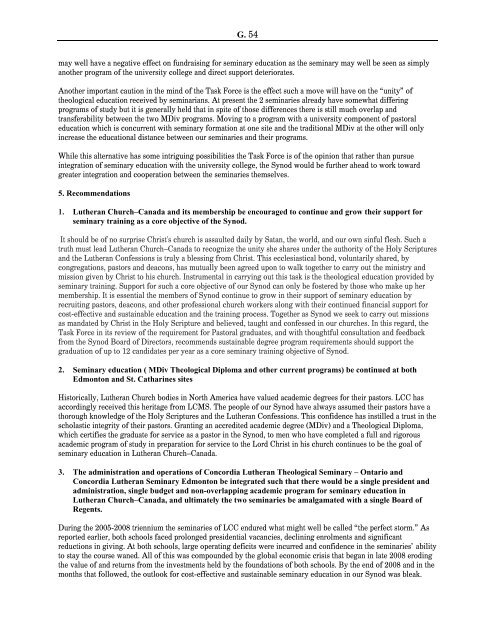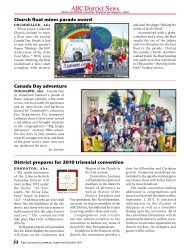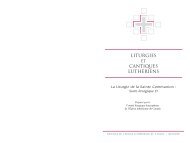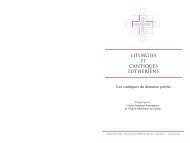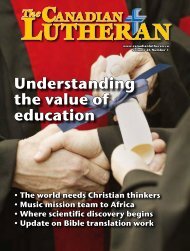Planned Giving Gift Summary - Lutheran Church-Canada
Planned Giving Gift Summary - Lutheran Church-Canada
Planned Giving Gift Summary - Lutheran Church-Canada
Create successful ePaper yourself
Turn your PDF publications into a flip-book with our unique Google optimized e-Paper software.
G. 54<br />
may well have a negative effect on fundraising for seminary education as the seminary may well be seen as simply<br />
another program of the university college and direct support deteriorates.<br />
Another important caution in the mind of the Task Force is the effect such a move will have on the “unity” of<br />
theological education received by seminarians. At present the 2 seminaries already have somewhat differing<br />
programs of study but it is generally held that in spite of those differences there is still much overlap and<br />
transferability between the two MDiv programs. Moving to a program with a university component of pastoral<br />
education which is concurrent with seminary formation at one site and the traditional MDiv at the other will only<br />
increase the educational distance between our seminaries and their programs.<br />
While this alternative has some intriguing possibilities the Task Force is of the opinion that rather than pursue<br />
integration of seminary education with the university college, the Synod would be further ahead to work toward<br />
greater integration and cooperation between the seminaries themselves.<br />
5. Recommendations<br />
1. <strong>Lutheran</strong> <strong>Church</strong>–<strong>Canada</strong> and its membership be encouraged to continue and grow their support for<br />
seminary training as a core objective of the Synod.<br />
It should be of no surprise Christ's church is assaulted daily by Satan, the world, and our own sinful flesh. Such a<br />
truth must lead <strong>Lutheran</strong> <strong>Church</strong>–<strong>Canada</strong> to recognize the unity she shares under the authority of the Holy Scriptures<br />
and the <strong>Lutheran</strong> Confessions is truly a blessing from Christ. This ecclesiastical bond, voluntarily shared, by<br />
congregations, pastors and deacons, has mutually been agreed upon to walk together to carry out the ministry and<br />
mission given by Christ to his church. Instrumental in carrying out this task is the theological education provided by<br />
seminary training. Support for such a core objective of our Synod can only be fostered by those who make up her<br />
membership. It is essential the members of Synod continue to grow in their support of seminary education by<br />
recruiting pastors, deacons, and other professional church workers along with their continued financial support for<br />
cost-effective and sustainable education and the training process. Together as Synod we seek to carry out missions<br />
as mandated by Christ in the Holy Scripture and believed, taught and confessed in our churches. In this regard, the<br />
Task Force in its review of the requirement for Pastoral graduates, and with thoughtful consultation and feedback<br />
from the Synod Board of Directors, recommends sustainable degree program requirements should support the<br />
graduation of up to 12 candidates per year as a core seminary training objective of Synod.<br />
2. Seminary education ( MDiv Theological Diploma and other current programs) be continued at both<br />
Edmonton and St. Catharines sites<br />
Historically, <strong>Lutheran</strong> <strong>Church</strong> bodies in North America have valued academic degrees for their pastors. LCC has<br />
accordingly received this heritage from LCMS. The people of our Synod have always assumed their pastors have a<br />
thorough knowledge of the Holy Scriptures and the <strong>Lutheran</strong> Confessions. This confidence has instilled a trust in the<br />
scholastic integrity of their pastors. Granting an accredited academic degree (MDiv) and a Theological Diploma,<br />
which certifies the graduate for service as a pastor in the Synod, to men who have completed a full and rigorous<br />
academic program of study in preparation for service to the Lord Christ in his church continues to be the goal of<br />
seminary education in <strong>Lutheran</strong> <strong>Church</strong>–<strong>Canada</strong>.<br />
3. The administration and operations of Concordia <strong>Lutheran</strong> Theological Seminary – Ontario and<br />
Concordia <strong>Lutheran</strong> Seminary Edmonton be integrated such that there would be a single president and<br />
administration, single budget and non-overlapping academic program for seminary education in<br />
<strong>Lutheran</strong> <strong>Church</strong>–<strong>Canada</strong>, and ultimately the two seminaries be amalgamated with a single Board of<br />
Regents.<br />
During the 2005-2008 triennium the seminaries of LCC endured what might well be called “the perfect storm.” As<br />
reported earlier, both schools faced prolonged presidential vacancies, declining enrolments and significant<br />
reductions in giving. At both schools, large operating deficits were incurred and confidence in the seminaries’ ability<br />
to stay the course waned. All of this was compounded by the global economic crisis that began in late 2008 eroding<br />
the value of and returns from the investments held by the foundations of both schools. By the end of 2008 and in the<br />
months that followed, the outlook for cost-effective and sustainable seminary education in our Synod was bleak.


